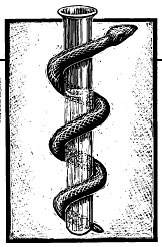Student Perspective
Medicine and research
By Paul Yang (email)
What year are you?" Whenever I'm asked that question by my fellow medical students, I have a hard time responding. I often answer, "M.D.-Ph.D." One loses count of the years when attending a program that lasts a minimum of seven years. Perhaps I should answer, "2006." But I find that the former reply often produces a more satisfying reaction. The next question is usually "Why?"
While medical education emphasizes the understanding and management of illnesses, research training enables one to explore the mechanisms underlying disease. By integrating both, M.D.-Ph.D.'s are better prepared to provide health care to patients, perhaps because they better understand the nature of disease. I live by the belief that knowledge comes not only from the classroom, but also from what one learns and discovers in the lab and the clinic. And what one learns in the classroom makes that much more sense when you know it will help someone someday. That is what the M.D.-Ph.D. means to me, and why I will ultimately devote eight years to the program.
Curious: I was born in southern Taiwan but moved to Seattle, Wash., at the age of two. My first eight years in Seattle's public school system were rather dull. I suppose more than anything that the slow pace of structured teaching and testing seemed artificial to me. But I was content to discover and learn by myself. I have always been amazed by machines and curious about nature.

|
|
It is certainly possible to do great medical research with either degree. But today, M.D.-Ph.D. programs formally facilitate the process of preparing for a career in medical research. |
Throughout high school and college, I immersed myself in physics, chemistry, biology, and math. I was interested in both biology and engineering —my father studied electrical engineering, so, naturally, engineering was always a possible career choice—but I thought I would have to choose one or the other to focus on. I was prepared to compromise my interest in biology until I stumbled upon an extraordinary interdisciplinary program tucked away in the Center for Bioengineering at the University of Washington. A full load of classes in the morning was complemented with laboratory research in the afternoon. I rotated through three labs and was mentored by both M.D. and Ph.D. principal investigators. Having been exposed to both clinical and basic research, I realized there was another decision to be made: M.D. or Ph.D.?
But my advisor suggested that I consider the idea of an M.D.-Ph.D. program—it would be a natural progression from bioengineering (biology and engineering) to medicine and research. It is certainly possible to do great medical research with either degree: my chemical engineering professor helped produce the first kidney dialysis machine, and one of my undergraduate mentors, a cardiovascular surgeon, is developing three-dimensional digital models of the heart. And M.D.'s may seek postdoctoral laboratory rotations, while Ph.D.'s may pursue collaborations with their clinical counterparts. So the idea of the medical scientist is not new. But today, M.D.-Ph.D. programs formally recognize and facilitate the process of preparing for a career in medical research.
Direction: As I spent hours preparing my applications, I began to realize that the work I had done in college truly pointed in the direction of M.D.-Ph.D. programs. Looking back now on my M.D. and my M.D.-Ph.D. interviews, I believe that the M.D. admissions committees suspected that I was bound for a dual-degree program. In a way, sometimes a profession chooses you.
It's an exciting and unique opportunity to study medicine and train rigorously in research techniques. Not only does the M.D.-Ph.D. program at Dartmouth provide comprehensive training in both basic research and clinical medicine, but the faculty are accessible and very helpful to students, regardless of their department affiliation.
For my thesis, I am working with Leslie Henderson, Ph.D., an associate professor of physiology and of biochemistry, on the actions of anabolic-androgenic steroids in the central nervous system (CNS). While such steroids are prescribed therapeutically, they are also abused and are increasingly popular among adolescents and elite athletes. Some of the undesirable psychiatric side effects include an increase in aggressive behavior and anxiety. We'll be using electrophysiological and molecular techniques to establish how these steroids affect certain receptors in the CNS, and, in so doing, we hope to better understand the physiological basis of steroid-induced psychiatric symptoms.
Another decision: I have spent the last two years working toward my Ph.D. as well as taking year-one medical classes. Teaching is also an important part of research, so I am doing some tutoring as well. In another three years, I hope to have completed my Ph.D. work, and then I will finish the last three years of medical school. At that point, another decision awaits me: will I concentrate on practice or on research, or do both?
Although I can picture myself in the clinic as well as in the laboratory, I know that no matter what I choose to focus on, the elements of research, clinical relevance, and teaching shall remain.
Paul Yang is a third-year student in Dartmouth Medical School's M.D.-Ph.D. program; he is doing his doctoral work in the Department of Physiology.
